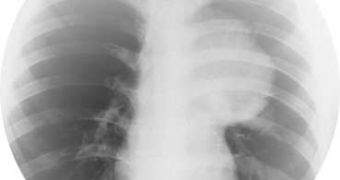A new type of radioactive isotopes may hold the key to tomorrow's lung cancer cures, says a team of scientists at the Allegheny General Hospital (AGH) in Pittsburgh, U.S. They have tested the new mesh of substances extensively over the past few years, and have come up with very encouraging results. While standard cancer treatments entail the complete removal of an affected lobe, this new method relies on radioactivity to protect the lungs.
In the test made by AGH radiation oncologist Dr. Athanasios Colonias and his team, the 1251 Vicryl (R) isotope was used to “wallpaper” the inside of a patient's lung. Instead of removing the whole lobe, the AGH team simply removed the tumor, and then surrounded the exposed tissue with a radioactive barrier, emitting a very low stream of radiations over a long period of time. By doing so, it is possible to avoid many casualties, as removing an entire lobe often leads to cardio-vascular complications, and eventually results in death. In fact, more than 40% of people diagnosed with cancer do not survive their first year of disease.
After 12 years of investigating and treating non-small cell lung cancer cases, the scientists in Pittsburgh noticed that the cancer they treated showed signs of recurrence in only 4.1% of cases, which is a significantly smaller percentage than the average 20% that patients get with regular, conventional therapies. Out of more than 145 patients, only 6 showed signs of other cancerous cells 36 months later, during follow-up tests. “Our study suggests that when [the isotope] is added to sub-lobar resection, the local treatment failure rate is substantially reduced,” says Colonias.
The research team hopes to be able to extend this treatment to other forms of cancer as well, in an attempt to improve the quality of life of those affected by a disease that kills 162,000 Americans each year. According to statistics revealed by American Cancer Society (ACS), casualties of lung cancer far exceed those of breast, colon and prostate cancer combined, mainly because of the virulent nature of the disease, that gradually diminishes the lungs' ability to transfer oxygen to the blood. This leads to further, fatal accidents, such as heart failures or the weakening of the circulatory and respiratory systems.

 14 DAY TRIAL //
14 DAY TRIAL //